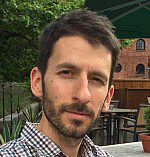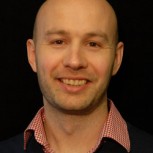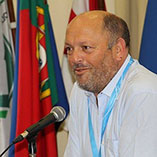Benoit Guilbaud
Benoît Guilbaud is a Teaching Fellow at the University of Sussex in the United Kingdom. His primary area of interest is Languages for Specific Purposes, and he has taught French for medicine, law and business, as well as translation courses. Together with David Tual (University of Cambridge) he co-organises the annual UK conference Languages for Specific Purposes in Higher Education (LSPHE.org) and has recently co-edited an issue of the Journal of Teaching English for Specific and Academic Purposes focussing on LSP. He jointly runs the LSP Focus Group for CercleS. He has also presented and published about digital literacy and networked learning and he was awarded two teaching awards in 2014 and 2016. He tweets as @BenGuilbaud.
David Tual
David Tual is Director of the Engineering Department Language Unit at the University of Cambridge. Prior to that, he taught and coordinated the French provision at the University of Durham Language Centre for 10 years. He has developed an interest in 21st century technologies and pedagogies, as well as Languages for Specific Purposes (LSP). Alongside Benoît Guilbaud, he coordinates the LSP Special Interest Group for the Association of University Language Communities (AULC) in the UK and Ireland as well as a similar Focus Group for the European Confederation of Language Centres in Higher Education (CercleS). He is also one of the founders of the GELS network, which brings together language teachers from engineering schools and technical universities across Europe and beyond.
LSP in the UK: giving languages a purpose
Despite the need for language skills in post-Brexit Britain, the number of students undertaking language degrees or studying a language at school in the United Kingdom has declined sharply. In this context, the development of applied, ‘non-specialist’ foreign language provisions presents a key objective for universities. The United Kingdom has witnessed an increase in its institution-wide language programmes in recent years, creating opportunities for LSP provisions to develop. Since 2014, David Tual and Benoît Guilbaud have worked to bolster what some have described as a resurgence in LSP in the UK. An annual conference, LSPHE, was setup in 2015 with a view to support LSP practitioners in the UK and in Europe. Alongside this yearly event, David and Benoît created focus groups in the UK and EU, published a website (lsphe.org) and recently edited a publication showcasing some of Europe’s leading LSP practice. Drawing from the above and their personal experiences in LSP, David and Benoît will present the state of affairs of LSP in HE in the UK and Europe. They will focus on the areas where LSP is strongly established but also present some more isolated successful cases that might pave the way for the future of LSP..Benoit Guilbaud & David Tual, Keynote speakers
Manuel Célio Conceição
Políticas Linguísticas e línguas no ensino superior: quais? Porquê? Como? Para quê?....
O ensino superior, como espaço de ensino, investigação, aprendizagem e criação de conhecimento, prepara profissionais altamente qualificados para o desempenho profissional aos níveis local e global. Propomos uma reflexão sobre o lugar das línguas neste nível de formação , considerando as funções individuais, sociais e institucionais que lhe são acometidas. Discutiremos a presença/ausência da diversidade linguística no ensino superior (ensino, investigação, transferência, governança), assim como a tipologia de conhecimento e de competências a privilegiar, antes de referir, entre outros, as necessárias inovações curriculares e metodológico-didáticas. Pretendemos reforçar a relevância da definição de políticas linguísticas, de que decorrem as decisões sobre a gestão das línguas no ensino superior, para a construção sustentada de pontes entre os saberes e os desempenhos profissionais.Manuel Célio Conceição, Keynote speakers
Inmaculada Fortanet Gómez
The Role of ESP In Today’s Higher Education
ESP has undergone an evolution in the past twenty years. From an isolated subject or extracurricular course preparing students for the job market, it has become an essential auxiliary resource in many degrees for the double function of teaching and learning professional and academic discourse in context. In this lecture, several aspects of the roles of ESP in higher education institutions will be tackled. I will start by analyzing how the Common European Framework of Reference for Languages has had an impact on ESP. Then, I will deal with the role of ESP in the introduction of English Medium Instruction, and how ESP teachers are very often the promotors of ICLHE and the teacher trainers of content teachers. The technologies have also had a strong influence on ESP teaching and learning, and this will also be an object of reflection. I will also provide an example of a successful experience using an online project. Finally, the lecture will focus on the classical and the new methodological developments: from needs analysis and genre-based teaching to the use of multimodal discourse analysis or the flipped classroom. The objective of this talk is to present an overview of today’s ESP and a glimpse of the future of ESP.Inmaculada Fortanet Gómez, Keynote speakers






